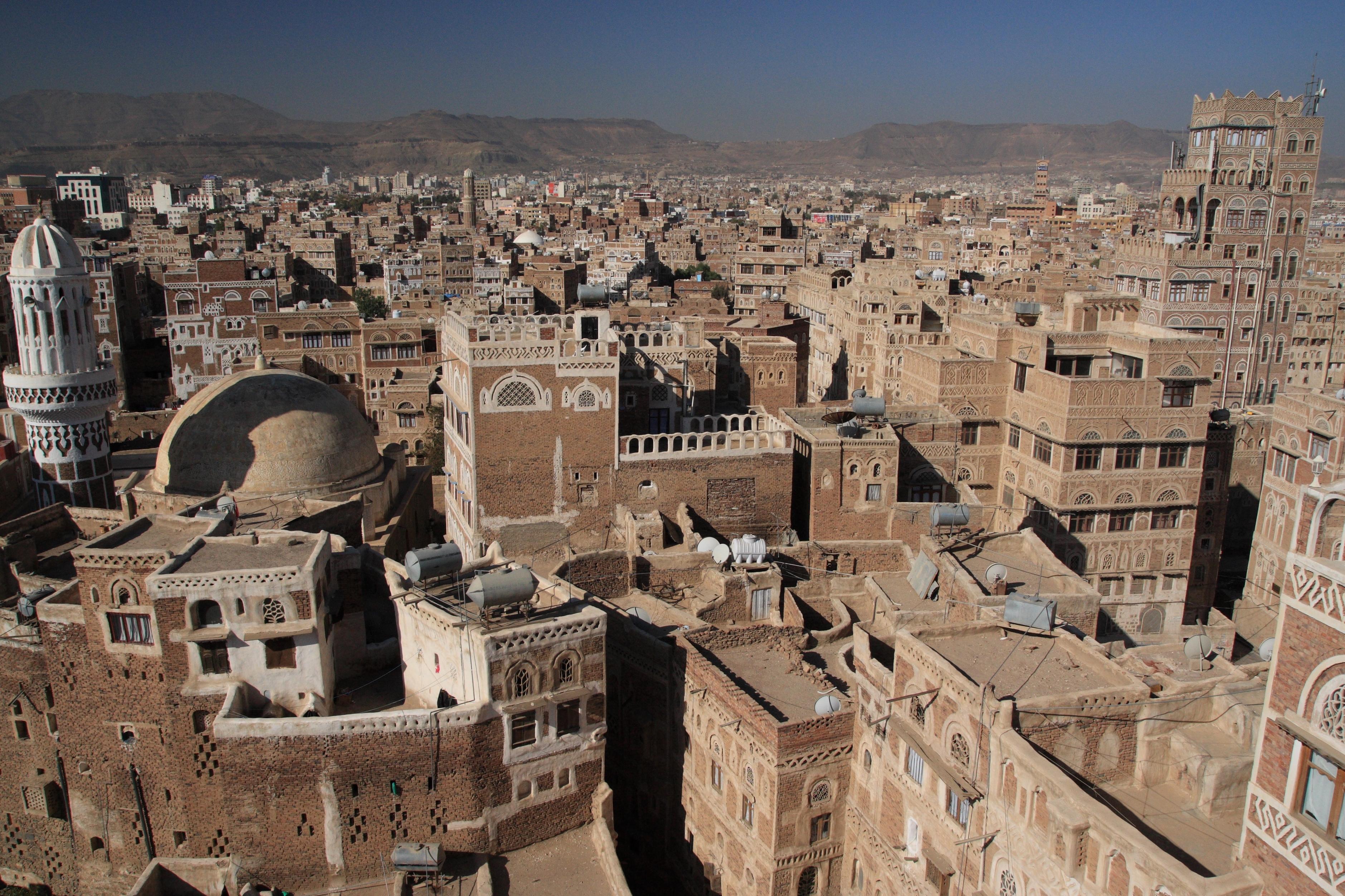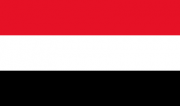
View of Sana’a, Yemen (Source: yeowatzup/Wikimedia Commons)

YEMEN
 Our Concerns
Our Concerns
- Gross violations of international humanitarian and human rights law by all parties to the conflict, including foreign actors;
- Severe humanitarian crisis leading to massive internal displacement, famine and the outbreak of cholera;
- Impunity of perpetrators of war crimes and crimes against humanity.
 Upcoming
Upcoming
- September 2018: Submission of the report of the eminent group of experts to the High Commissioner;
- October 2018: Deadline for the submission of Yemen’s third periodic report to the Human Rights Council ahead of the Universal Periodic Review.
December 29, 2017 marked 1,000 days of war in Yemen, which has been devastated by the three-year-long armed conflict. Civilians, caught between warring parties, continue to bear the heaviest price, as they are targeted in military operations and gravely affected by the destruction of civilian infrastructure. More than 80% of the population suffers from a lack of food, water, fuel and access to healthcare.
As of December 2017, the UN OHCHR reported that more than 5,500 civilians have been killed, and 9,065 injured since March 2015, many of them in air strikes carried out by the Saudi-led coalition, although the real number of casualties is arguably much higher. The conflict, along with the blockade imposed by the coalition, has created the world’s largest humanitarian crisis, with around eight million people on the brink of famine, and 3.3 million people – including 2.1 million children – already acutely suffering from malnutrition. Cholera has surged across the country due to the shortage of clean water, leading to more than 2,200 deaths. According to the International Committee of the Red Cross, as of late 2017, the number of suspected cholera cases has reached one million.
The humanitarian crisis worsened in November 2017 when Saudi Arabia intercepted a Houthi missile targeting the Saudi capital, Riyadh. In retaliation, on November 6, Saudi Arabia broadened its land, air and sea blockade, preventing humanitarian supplies from entering Yemen, and cutting the amount of essential goods getting into the country by more than a half. The blockade was lifted in late December following widespread international condemnation.
The situation further deteriorated in early December, after Yemen’s ousted leader Ali Abdullah Saleh publicly turned against his Houthi allies and expressed his openness to hold talks with the Saudi-led coalition. After two days of intense street battles between the rival factions in Sana’a, Houthi fighters executed Saleh and started to crack down on his supporters, including officials in Saleh’s political party, the General People’s Congress (GPC).
In the midst of the conflict, the United Arab Emirates (UAE) consolidated its control over large parts of southern Yemen through the financing and training of local armed groups, which are pushing towards the Red Sea port city of Al Hudaydah, a Houthi stronghold where 80% of food supplies enter the country. Moreover, following Saleh’s execution, in mid-December, Saudi Arabia and the UAE held talks with the chairman of the Al Islah party, in a bid to unite efforts to defeat the Houthis.

Violations of international humanitarian law
|
Since the outbreak of the armed conflict in March 2015, violations of international humanitarian and human rights law have been committed by all parties to the conflict, with the civilian population bearing a heavy cost. In its latest report, presented to the Human Rights Council in September, the OHCHR found that civilians were most likely “directly targeted, or that operations were conducted heedless of their impact on civilians and without regard to the principles of distinction, proportionality and precautions in attack”, and that the governorates mostly affected by the attacks were Aden, Al Hudaydah, Sana’a and Taiz.
“Since the outbreak of the armed conflict in March 2015, violations of international humanitarian and human rights law have been committed by all parties to the conflict, with the civilian population bearing a heavy cost.”
Airstrikes by the Saudi-led coalition and shelling by the Houthi-Saleh forces repeatedly struck areas densely populated by civilians, such as residential areas and markets. The necessary precautions to avoid or minimise civilian casualties were not taken, despite the apparent impact of the attacks on civilians, who were not given effective advance warnings to leave areas of operations safely. These serious violations of international humanitarian law may amount to war crimes.
Furthermore, the practices of arbitrary detention and enforced disappearance remain widespread, in violation of international humanitarian law, which demands that all sides to a conflict abstain from arbitrary deprivation of liberty and enforced disappearance. In its report, the OHCHR denounces the fact that civilians who “spoke out or otherwise opposed the parties to the conflict were subjected to harassment, intimidation, detention and, on occasion, torture and killing”.
The cases of Walid Al Abi, Adel Al Zuairy and Ahmad Al Haj, which Alkarama and SAM for Rights and Liberties referred to the UN Special Rapporteur on extrajudicial, summary or arbitrary executions in May, illustrate such practices. The three men were abducted in Sana’a in late 2016 by armed men of the Houthi-Saleh Coalition. They were then taken to unknown places of detention, where they were held for periods ranging from four days to four months, before their families received confirmation that their relatives had died in detention. The bodies of the men showed clear signs of torture, which is likely to have been the cause of their death. In fact, Walid Al Abi was found shot in the head, with the Houthi authorities claiming that he had committed suicide despite the forensic report showing clear signs of torture. In the cases of Ahmad Al Haj and Adel Al Zuairy, the authorities refused to conduct forensic examinations following their deaths. The three men’s families believe that their relatives were tortured and executed because of their affiliation to the Al Islah party, which is opposed to the Houthi-Saleh coalition.

Violations committed by UAE and U.S. forces
The United Arab Emirates directly supports Yemeni forces including the “Security Belt” that operates in Aden, Lahj, Abyan, and other southern governorates, and the “Hadrami Elite Forces” that operate in Hadramaut.
The Security Belt forces were formed in 2016, and are officially under the authority of the Yemeni Ministry of Interior, whereas the Hadrami Elite Forces are formally a part of the Yemeni army. While the UAE claims that both forces are under the control of the Yemeni Armed Forces, the UN Panel of Experts – established pursuant to Security Council resolution No. 2140 (2014) – concluded that the Hadrami Elite Forces are effectively under the operational control of the UAE, which oversees ground operations. The UN Panel further found that the Security Belt also largely operated outside the Yemeni government’s control.
In its September report, the OHCHR stated that, in 2017, allegations of human rights violations were made against both forces. NGOs have further reported that they arbitrarily detained, forcibly disappeared, tortured, and abused numerous victims. Moreover, sources including Yemeni government officials have reported the existence of several informal detention facilities and secret prisons in Aden and Hadramaut, including at least two run by the UAE and others run by UAE-backed Yemeni security forces.
In June, the Hadi government announced that it would investigate such reports of torture and enforced disappearances by the UAE and its allied Yemeni forces south of the country. However, no conclusions have yet been made public to date.
“The practices of arbitrary detention and enforced disappearance remain widespread, in violation of international humanitarian law, which demands that all sides to a conflict abstain from arbitrary deprivation of liberty and enforced disappearance.”
The United States have also worked closely with the UAE in its fight against Al Qaeda, and have conducted joint raids in central and eastern Yemen. In fact, Alkarama referred the case of 15 women and children who were killed in January in a military operation by American and Emirati military forces, to the UN Special Rapporteur on extrajudicial, summary or arbitrary executions. In the early morning of January 29, U.S. Navy SEALs and Special Forces from the United Arab Emirates were dropped from helicopters in the Yakla region of the Al Bayda governorate. The commandos approached the houses of Sheikh Abdulrauf Al Dhahab and Sheikh Saif Nams Al Jufi, but were detected, and intense firefight broke out. As U.S. troops came under fire, they called in an airstrike targeting the suspects’ houses from the U.S. Marines that were standing by aboard the USS Makin Island in the Gulf of Aden.
Local sources confirm that two U.S. planes approached from the nearby mountain, followed by four armed drones and four helicopters. Reportedly, 16 rockets were fired, destroying four houses. The American and Emirati forces completely destroyed their targets’ family houses despite knowing that their whole families were present. The total number of casualties amounted to about 30 people, including six women and nine children.

UN independent experts appointed to investigate human rights abuses during armed conflict
In September 2015, a national commission of inquiry was established by Yemeni President Hadi to investigate the violations committed by all parties to the conflict. The following month, the UN Human Rights Council endorsed the Yemeni national commission of inquiry following a resolution drafted by Saudi Arabia. However, the commission was criticised, including by the OHCHR, for being unable to implement its mandate according to international standards. In fact, it soon became apparent that the commission did not enjoy the cooperation of all parties and could not operate in all parts of Yemen. As a result, for two years, human rights organisations and the OHCHR repeatedly called for the establishment of an international commission of inquiry, demanding accountability for the serious violations of human rights committed by all parties to the conflict, as well as justice for the victims.
Previous attempts to adopt a resolution establishing such a commission of inquiry had failed for reasons including the pressure of Saudi Arabia, which, as a party to the conflict, argued that a national commission was in a better position to investigate human rights violations and that it was not yet time for an international inquiry.
Yet, on September 29, the Human Rights Council adopted a resolution to appoint a group of eminent international and regional experts to inquire on human rights violations committed by all parties to the conflict. In the resolution, the Council denounced the ongoing violations of international humanitarian law, making reference in particular to the recruitment of child soldiers, arbitrary arrests and detention, the denial of humanitarian access, and attacks on civilians and civilian objects.
The resolution gives the experts authority “to monitor and report on the situation of human rights, to carry out a comprehensive examination of all alleged violations and abuses of international human rights and other appropriate and applicable fields of international law committed by all parties to the conflict since September 2014”. They are due to submit a comprehensive written report to the High Commissioner by September 2018.